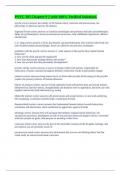PSYC 305 Chapter 9 || with 100% Verified Solutions.
psyche correct answers the totality of the human mind, conscious and unconscious, not
physiology or physical aspects, the abstract
Sigmund Freud correct answers an Austrian neurologist and professor and later psychotherapist,
father of psychoanalysis, focus on unconscious processes, early childhood experiences, defence
mechanisms
C.G. Jung correct answers a Swiss psychiatrist and psychotherapist who worked with Freud, but
later founded analytical psychology, focus on collective unconscious, archetypes
problems with the psyche correct answers 1. what aspects of the psyche best explain human
behaviour?
2. how are the mind and psyche organized?
3. how does the psyche manage threats and anxiety?
4. how can we best describe personality development?
psychic energy correct answers a source of energy within each person, responsible for
motivation, remains constant throughout lifetime, redirection results in personality change
instincts correct answers strong innate forces or drives that provide all the energy in the psychic
system, the primary motives of human behaviour
history of instincts correct answers Freud originally found self-preservation and sexual instinct,
influenced by Darwin's theory, thought libido and thanatos were in opposition, but both can work
together and involve both behaviours eg. eating
libido/life instinct correct answers self-preservation and sexual instinct, or any need-satisfying,
life-sustaining, or pleasure-oriented urge, communion (Freud)
thanatos/death instinct correct answers the fundamental human instinct toward destruction,
sometimes self-destruction, often manifested in aggression, agency (Freud)
teleology correct answers free will and goal-directedness explain human behaviour, not
unconscious processes, deemphasis on role of unconscious mind and negative drives, concerned
with how people set goals, find purpose or meaning in their lives
conscious mind correct answers the part of the mind that contains all the thoughts, feelings, and
perceptions you are presently aware of
preconscious mind correct answers any information that you are not thinking about, but that
could easily be retrieved and made conscious
, unconscious correct answers largest part of the human mind, containing unacceptable
information, troubling, distressful memories, feelings, thoughts, or urges, including instincts,
difficult to access
psychic determinism correct answers the idea that everything we do are expressions of the mind,
nothing happens by chance or accident, there is a reason behind every act, thought, and feeling,
which can be discovered by examining the contents of the unconscious mind, most symptoms of
mental illness are caused by unconscious motivations
psychoanalytic personality theory correct answers theory of how people cope with sexual and
aggressive instincts that lead to drives and urges within the constraints of civilized society
id correct answers the most primitive part of the human mind that we are born with, the source of
all drives and urges, operates according to pleasure principle and primary process thinking,
dominates in infancy, wish fulfillment, biologically determined
pleasure principle correct answers desire for immediate gratification
primary process thinking correct answers thinking without logical rules of conscious thought or
an anchor in reality
wish fulfillment correct answers the id may create a mental image or fantasy to satisfy its needs,
mental energy is invested, urge is temporarily satisfied, works temporarily to gratify the id
ego: Freud correct answers the executive of personality, the part of the mind that constrains the
id to reality, understands that urges of id are often in conflict with social and physical reality, the
part of the mind we are more aware of, develops by two or three years of age, operates according
to reality principle and secondary process thinking
reality principle correct answers understanding that urges of the id are often in conflict with
social and physical reality, so actions must be avoided or redirected
secondary process thinking correct answers the development of strategies for solving problems
and obtaining satisfaction, often involves taking into account constraints of physical reality
superego correct answers the part of the mind that internalizes the values, morals, and ideals of
society, usually instilled by society's various socializing agents, begins to develop around age
five, determines what is right and wrong, not bound by reality, often referred to as conscience
interaction of the id, ego, and superego correct answers id, ego, and superego are in constant
interaction and have different goals, which provoke internal conflicts within an individual, may
lead to anxiety, a well-balanced mind free from anxiety is achieved through strong ego
iceberg metaphor correct answers id is the largest part of the iceberg, completely submerged
underwater or unconscious, is motivated, has strong influence on behaviour, superego is mostly




